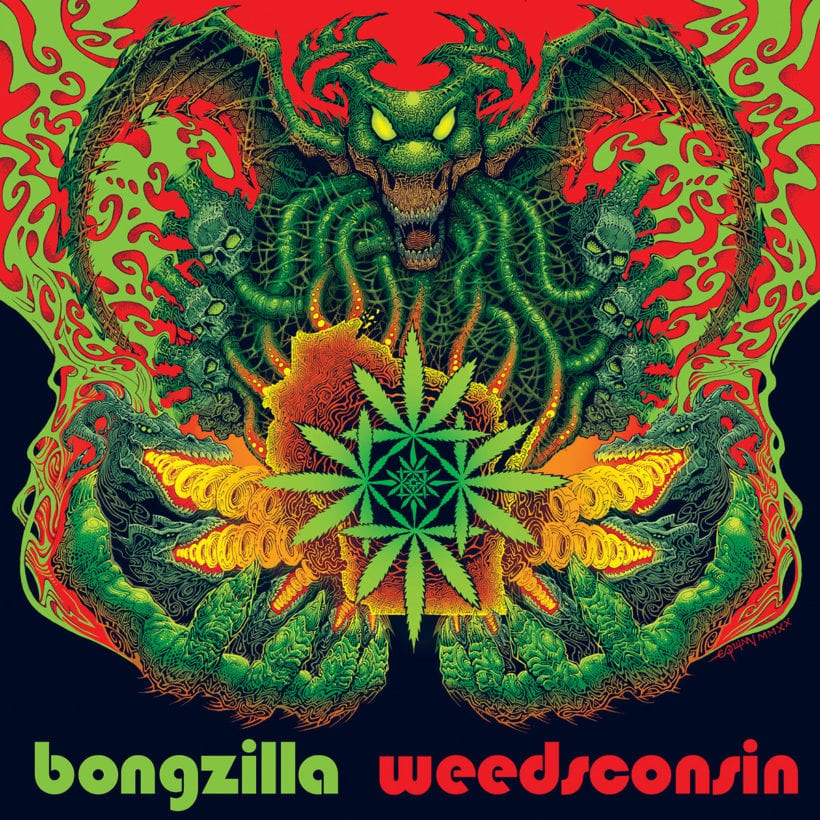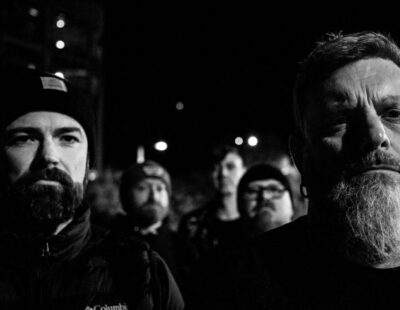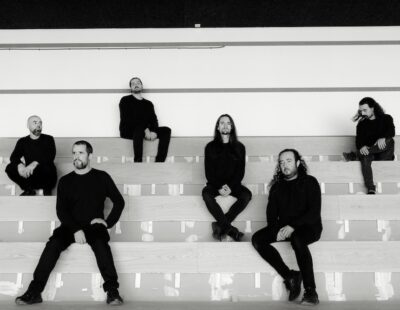
4/20 is a big day for Wisconsin stoner metal institution Bongzilla. Not only is it an excuse to smoke more pot than usual—not that the members of the band need any encouragement—it’s the release of Weedsconsin, Bongzilla’s first album in 16 years. To celebrate, Decibel caught up with founding member Mike ‘Muleboy’ Makela to talk about Bongzilla’s first album as a trio, their upcoming split with Tons, marijuana legalization, the internet and getting the band back together after a hiatus.
Weedsconsin is out today via the band’s new label, Heavy Psych Sounds. and the Doom Sessions Vol. 4 split with Tons is out on April 23 on the same label. Visit their webstore to order and keep reading for the interview, edited for length and clarity.
This is the first new Bongzilla album in almost 20 years. Why did you start to write and record new music now?
We had time to write music because of Covid was a lot of it. We had three songs written—”Free the Weed,” “Space Rock” and a song that’s gonna be on the Tons split, “Mother Flower’s Little Helper,” all when Cooter [Brown] was still in the band. I think those were written four or six years ago when we first started playing again.
So then Cooter quit and I switched to bass and we were out three days on a tour when COVID hit. We were like, “Let’s try to do this,” and we started getting together more. We’d sit and jam for a long time. We’d only practice once a week but we’d just jam out on these riffs. Suddenly, we had five more songs.
We weren’t working either. Jeff was working but me and Magma, we would get together and just jam a lot. We have another band called Aquilonian so we get together and jam probably more than us three or us four ever did anyway, which I think helps when I switched to bass. Me and Magma have always been so locked in. Christ, we’re in like almost Grateful Dead Territory; I think we’ve jammed together for over 20 years. I bet we’ve played music together almost 25-30 years. We had bands before Bongzilla together.
You guys have been doing it for a while.
Those five years we were just touring and always getting ready for a show or to go out on the road, or to fly over to Europe or something. We just didn’t have time.
It takes a while. We smoke a lot of pot, play a little music. [laughs]
You’re just making music when you’re ready to and when you want to versus feeling like you have to put anything out.
Amerijuanican was weird. I wrote probably 70% of that on my couch because we owed Relapse a record. You’re in art class and your project is due on Monday and you didn’t start it, and it’s Friday and you want to go hang out with your friends and smoke pot? Get wasted and try to pick up girls or something and you have to sit home and do your art fuckin’ project. That’s what writing that record felt like.
We went back to jamming and shit falling out of us. Sometimes you can channel when you get as high as we do at practice.
When you started doing those shows back together, did everything feel pretty natural?
Yeah. Me and Magma were still playing together. I had other bands and other shit going on. I was making lower-toned Merzbow kind of noise and to me, it was like “Oh shit, I forgot how much fucking fun I had with these guys.”
We had always been such buddies for so long, then the years at the end, when we took what we call our hiatus—”H – I – G – H -atus”—we didn’t really talk. Everything was disintegrated and in the years after, we didn’t really hang.
It was like hanging out with old buddies again that you should have never lost touch with. It was real natural. What started us really jamming again was that people would offer us—when I heard the numbers, it had grown so much bigger. I remember talking to Dixie [Collins] about what Weedeater was getting paid too.
I was like, “Are you fucking kidding me?” and he’s like, “Yeah man, you should start Bongzilla back up!”
We got an offer from a festival, Temples, where they never paid us. It’s funny that we started jamming together because of this offer, but me and Cooter—Cooter moves back to Madison [WI] and moves literally across the street from me. He would come over and we’d just play acoustic guitars and drink beers and smoke. Me and him were just getting to be buddies again, and then this offer came in and I don’t know if I was really high or what—it was like 6,000 euros. I was like, “Are you fucking kidding me? You’ll fly us over, we’re gonna play one show, not get paid in the end” but whatever. He started us again.
I say yes to the kid and then I get off the phoen and I’m like, “Oh, fuck, man. I got to call these guys and ask them if they’re going to do it.”
We did tours right after. We did Scandinavia when we did that festival, so we actually came home with money and the shows were all amazing. We were like, “What the fuck is going on? What happened when we just sat around in our houses and smoked pot for 11 years?”
People started to care about stoner-doom again.
Sabbath worship is cool. A lot of these—they could be my kids if not my grandchildren at some shows. That’s cool that these kids are getting into it. Where I grew up, you were the super weird kid because you were listening to Black Flag and the Dead Kennedys. I grew up in a really small town in northern Wisconsin and you were a burnout if you listened to Sabbath.
I guess if you smoked pot like I did, you might be considered a burnout.
Smoke pot like you did then or like you still do now?
Oh, I still do now. I work at a coffee shop. I can’t be puffing at the counter while I’m making mochas, but if I can be smoking, I’m smoking. I’ve been hitting the pipe while I’ve been sitting here.
You were saying that a lot changed over the years you weren’t playing. I think also weed has become a more normal thing to talk about.
No kidding. At work, early 2000s, they went, “What’s the name of your band?” If I did said say Bongzilla, they’d say “Bonzilla?” and I said, “Yeah, perfect.” Now, I’m like “Oh yeah, Bongzilla. Maybe what you do want to find in your kid’s closet because he’s probably getting better weed than you, sir.”
Now these people are smoking. It’s not legal here, it’s very decriminalized, but we’re surrounded by legal states. This town has always been a weed town, Madison. It’s got one of the longest running marijuana festivals in the country, Harvest Fest, every October. My weed habits—what happens to me, I just quit drinking. I think I’m at 80 days or something now.
In Wisconsin, there’s such an alcohol culture that day drinking is so fucking acceptable. It’s like the French—if something really good is happening, you can go burn down your city or if something really bad’s happening, you can do the same thing. In Wisconsin, you day drink, which means you punch in to drink, 16 hours of drinking so I needed to stop. I wasn’t drinking when we recorded either and I think that’s the truth of marijuana and Bongzilla.
The music’s way better when we’re not doing other stuff. We don’t drink at practice anymore like we used to. We’re just smoking. My point was that—what was my point? God dammit. Hold on. [lights pipe]
You wrote a few of the songs while you were still playing with Cooter but this is your first album as a three piece, so did it affect the writing process for the songs that weren’t with him?
I think it made it easier because of us knowing each other so well. To me, you listen to that record, we freed up Spanky. I don’t think anybody knew how good of a guitar player Jeff really is. I think with four people there’s just so much more room.
There’s less rooms for anything bad to happen. With how much we’ve played music together, we don’t count. We just play a song and after playing it the tenth time, that’s how we play it. It fucks with us when we record because I don’t necessarily know when to start singing because I don’t know how many times we really do it.
It’s a very jam band mentality.
In the studio, it got very more jam band. We would play some of these songs for really long. “Earth Bong,” we would play that for 20, 30 minutes because there’s a jam part. I remember at a practice we were like, “Let’s change our name to the Al-bong Brothers band.” [laughs]
It keeps us really different than a lot of sludge bands. We do go off into the stoner-sphere.
It was right around now, around March 15 that Philadelphia went into a lockdown situation, so we’re coming up on a year [of the coronavirus pandemic].
Crazy. And we seem to be pretty good now, at spreading Covid. We’ve done nothing but kick ass.
My fear, even beyond when it’s all over, how long can a place like Kung Fu Necktie not have shows? Clubs would rotate a lot anyway—not as much these days, but early 2000s when we would tour a lot with Weedeater, the next time you went through San Antonio, that club was gone. Even the bigger clubs—who has a year of rent?
The bigger clubs are probably going to be the ones who get money from our government at all. Our government just doesn’t support arts and clubs are for sure not high on the list of worrying if they’ll be around or not. Maybe it’ll be a little different with the great Democratic change, but it’s all hope in the end.
It doesn’t feel like we’re on the radar but we can always hope.
I would have never guessed that weed would be legal in this many states. Not in a million years. Not at all. And it took a long time after California did it, or California and Washington did it at once, then it took quite a while. Now, it’s just exploding. If you think about it, it’s probably lobbying money and stuff. Now there’s marijuana lobbying organizations.
It’s just exploding. I never would have guessed that would happen at all. When we were scoring brown, seedy weed all over the country in like ’95. Where we lived there was old hippies that would grow, so we were smoking really good weed pretty early but on the road it was always hell.
I’m guessing you don’t find it that hard to find inspiration for new ways to write about weed?
Oh, not at all but you think it would be hard. If somebody would tell me you have to exclusively sing about this, especially marijauana. What do you mean? The five-pointed leaf!There’s a song, that’s it, I got one song. I’m done. How do you do that?
Early on, it was the one thing that made me—I could go to the bar and get wasted and get in a fight but I couldn’t walk around with weed. Even up to the 2000s, when I was growing up, you went to jail for a long time for a little bit of weed. Early on, it being illegal and the percentage of people in jail for marijuana offenses being as high as it, even to this day, is, is what angered at least the vocals. We’ve always been jammy, I guess.
Holy shit, what was the question? That’s like the third time that happened. I’m going to have to remember what strain this is.
Is it hard to come up with inspiration for new ways to write about weed?
Where I was going is that these are just stories of our lives. “Greenthumb” from Gateway is literally about me growing weed in my backyard. The song “Gateway” is about me using pot to get clean from heroin. Also, there’s a little sarcasm, with the title of the record too. I remember thinking, when it disintegrated, we were all doing stupid shit. I was a pincushion. I remember thinking, “God, the government would love if somebody in this band—not that we were anybody big enough—a fucking dude in Bongzilla died of a heroin overdose.” See? It is a gateway drug.
Your last releases before your hiatus came out on Relapse. It seemed like your relationship with them was getting a little strained and you were a little tired of things. What made you sign with Heavy Psych or releasing the music on your label?
We repressed Apogee as a test to see how far we could get a record if we released it ourselves. And that’s what we were doing the whole time, and then Heavy Psych got ahold of us. The deal was just beautiful, just taking care of us. It was worth it, so we licensed it to them and unlike other, bigger record labels they’re still letting us do splits and the 7-inch thing. I don’t think we have any animosity toward Relapse or anything. We were always just such a little fish on that label.
Maybe this is marijuana paranoia—we’d always stop at their compound. We’d be pulling in and we’d be like, “We’re getting axed today!” We didn’t sign a contract until Gateway.
“Uh, we didn’t pay for those T-shirts and those records, we just used it for weed. We’re done!” And then it would never happen and I just don’t think you need a Relapse, we don’t need a Relapse anymore. Heavy Psych Sounds, we could benefit each other.
Wonderfully, Relapse got our name around the world. But you can get your name that far on the internet now. I come from tape trading. It sounds just crazy. Where I grew up, if I sent a tape to California, it might be a week before I got a tape back. But shit, I found out about Eyehategod through tapes. And zines! No more fuckin’ zines.
But on the same hand, you can put out your own record on Bandcamp, promote it on everything from Youtube to all the social medias and then even book your own tour through social media, not really need a label if you get out on the road. Kids gotta get out on the road to then do it, but I don’t know if you really need labels anymore at all these days. But I like labels and it was a great fit.
It’s so different than it used to be.






